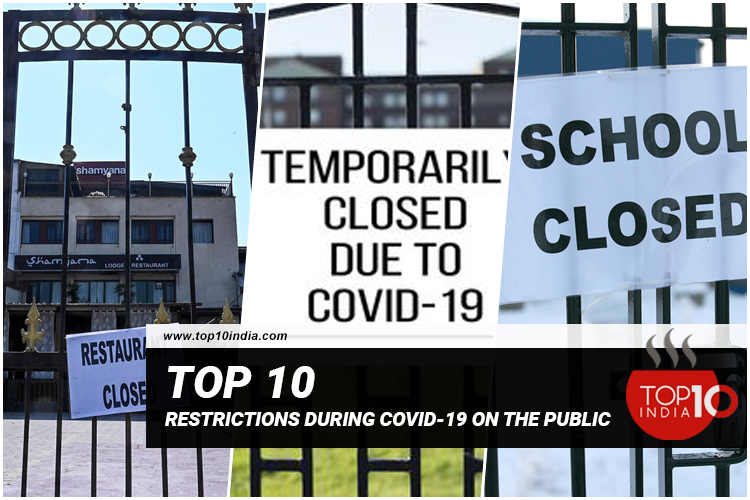Top 10 Restrictions During Covid-19 On The Public: The number of people infected with Covid-19 is drastically increasing worldwide. The government must find those who break the rules and regulations. Local governments may appoint a street-level volunteer to search for residents wearing masks and follow the listed guidelines.
Top 10 Restrictions During Covid-19 On The Public
No 1. Hotels declared closed
Summer is a critical time for the hotel industry, as it generates a large portion of its income from domestic leisure and weddings. However, the industry is once again on the back foot after the second wave of Covid-19 struck the country.
Even if patterns begin to reverse in the second quarter, industry participants conclude that business will remain subdued for the remaining fiscal year. To deal with the problem, the industry has asked state governments to waive property taxes, liquor license fees, energy charges, and local taxes, among other things, to help the industry get through the current crisis.
According to experts, smaller hotels have been hit the hardest, and it could take two years for the hotel industry to recover fully.
No 2. Colleges have been closed
The rapid rise in COVID 19 cases has forced the closure of universities, colleges across India. Several states and union territories have already decided to close their educational institutions. Around the same time, other states are examining the situation to decide as soon as possible.
The following is a list of states and universities that have already closed their doors. Haryana, Odisha, West Bengal, Uttar Pradesh, Bihar, and Rajasthan are among the states with closed schools and colleges. Several colleges have also decided to postpone their exams. On the other hand, most schools and universities have been granted permission to continue offering online classes to students.
No 3. Schools were shut down
According to a UNICEF survey, 1.5 million schools in India have been shut down because of the coronavirus pandemic, affecting 247 million children enrolled for education.
According to the study, more than 168 million children’s schools around the world have been closed for almost a year. Any decision to reopen schools is taken with the best interests of children in mind, and when schools reopen in stages with students returning to their classes, we must work hard to help them catch up on the learning they have missed.
No 4. Hostels in India are also close
The government of Madhya Pradesh is taking all precautionary steps to prevent the spread of coronavirus infections. The government has now agreed to close all hostels in Bhopal, the state capital, permanently. Avinash Lavonia, the Bhopal District Collector, has instructed the hostel superintendents that both undergraduate and postgraduate exams for the academic year 2020-21 will be conducted in All undergraduate and postgraduate exams for the academic year 2020-21 will be held according to his instructions.
No 5. No malls during covid (Top 10 Restrictions During Covid-19 On The Public)
Due to concerns about the coronavirus, a few Indian cities, including Mumbai, Pune, and Bengaluru, have ordered the temporary closure of all shopping malls beginning March 14, 2020, for one to two weeks. Malls are essentially an annuity company with a few seasonal fluctuations captured by revenue share when store consumption reaches a certain level.
A minimum assurance guarantees the mall operator’s downside security during leaner times. According to the study, the most likely scenario is that mall owners and retailers would share the losses because malls have evolved into a relationship-based business with the same retailer having multiple locations.
No 6. Weddings and event gatherings restricted
In a private or public space, large gatherings bring together many people from various households. Large gatherings are mostly scheduled activities with many guests and invitations. They can include things like accommodation, protection, tickets, and long-distance travel.
The CDC’s guidelines can cover conferences, trade shows, sporting activities, festivals, concerts, and other major events. The risk of infection and spread among attendees is increased by high or increasing COVID-19 cases in the event location or the locations from which the attendees are traveling.
No 7. The offices will remain close
Officials said private offices in Delhi will be protected by the week-long curfew and will be asked to operate from home to prevent increased physical contact with the public. Chief Minister Arvind Kejriwal declared that Delhi would go into a six-day lockdown starting Monday night to stop the spread of Covid-19 incidents, increasing exponentially.
According to officials, the lockdown in Delhi will begin Monday night and last until the early morning of April 26. Officials said private offices in Delhi will be protected by the week-long curfew and will be asked to operate from home to prevent increased physical contact with the public.
No 8. Less public transport
During the 14-day lockdown in Karnataka, which runs from Tuesday morning to May 12 morning, metro rail, taxi, and bus services will not be available. Schools, colleges, hotels, cinemas, shopping malls, stadiums, and swimming pools will be closed.
According to the order, all social, political, sporting, entertainment, academic, cultural, religious, and other gatherings and congregations are prohibited, and religious places will remain closed to the public. During the lockdown, scheduled flights and trains will run, and tickets will serve as a pass for passengers to board flights and trains via taxis, cab aggregators, and autorickshaws.
No 9. Temples will remain sealed
From May 10 to 15, the Sri Varaha Lakshmi Narasimha Swamy temple in Simhachalam will be closed to visitors. Following requests from temple priests and in light of the upcoming Chandanotsavam, Executive Officer M.V. Suryakala made this decision with the Trust Board’s approval. During this time, the priests have asked the authorities to limit the number of devotees who may enter the temple.
The Somnath Temple Trust has declared that the temple will be closed to devotees beginning April 11 for an indefinite period due to increased COVID-19 infections.
No 10. No coaching institutions (Top 10 Restrictions During Covid-19 On The Public)
With schools and colleges being closed, coaching or tuitions will also remain shut. To avoid the extra crowd in any way, this step has been taken. Online classes to continue for the rest of the schedule. Students do not miss their chapters; hence online classes will help them cover what was missed during a lockdown.
FAQs
1. Can the Covid-19 survive in drinking water?
- No evidence as such tells whether covid-19 survives in drinking water.
2. What precautions can I take to avoid contracting Covid-19?
- Stay Home, Stay Safe.
3. Are small gatherings safe during covid-19 Pandemic?
- No gathering is safe during covid-19. If the gathering is small, social distancing can be followed in a better way.
4. Can I Catch Covid-19 while swimming in a pool?
- Yes, you can surely catch covid-19 in the swimming pool if the other person having covid sneezes in the pool.














Be First to Comment